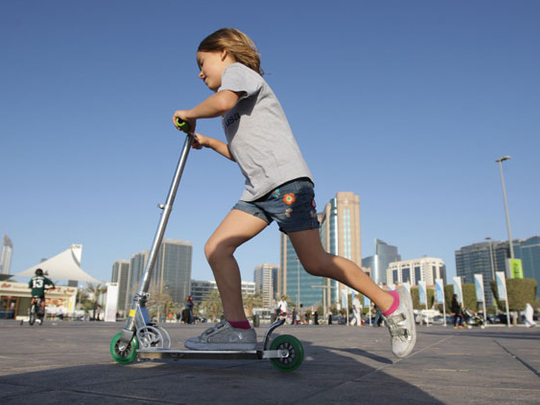
Dubai: 62 per cent, or roughly six out of 10 of UAE children play alone which could potentially negatively affect their development, a new UAE study revealed.
The study titled Children’s Play Index in the UAE aims to gauge if UAE children have a good balance between play and other activities. It was independently conducted in between July to September 2012 by TNS Research Agency and commissioned by family leisure company Fun City. The study was released on the occasion of the Universal Children’s Day that is celebrated annually on November 20.
The research involved 400 family respondents of different nationalities and particularly focused on the play behaviour of their children from ages two to 12.
“What we see from the research is there is an over emphasis on [children] playing alone which is probably driven by expatriate communities that don’t have extended families or may not have a sense of community or the lack of places that enable families to gather and interact on a regular basis,” Dr Sandra Willis, Fun City’s Parenting Consultant, told Gulf News.
This alarming fact stresses the need and importance of primary socialisation for the child’s development and more facilities for play areas and community centres, Dr Willis said.
“Even from an early age, it’s very important to socialise and socialising through play is the ideal scenario. At the same token, you want children to have some space to drive their own play activity that’s called free child-driven play,” Dr Willis said.
With the transient nature of the community of Dubai, Dr Willis said that parents must instill in their children the ability to have resilience to cope and to diversify their friendship circle.
The study likewise revealed that with the UAE’s play index score at 32, children here have a good balance between play and other activities during their daily routine. But it points out to an imbalance between indoor versus outdoor, active versus passive play activities which need attention, Silvio Liedtke, COO of Landmark Leisure, said.
Based on the study, a large portion of Emirati and Arab children spend time playing indoors while 33 per cent of Asian expat children play outdoors. Western children are usually sent out to play sports.
The study also revealed that one out of four of UAE children spend an average of three hours per day on an activity involving interaction with technology such as watching TV, playing video and internet games. One in five kids watches TV for an average of over four hours daily. And one in 10 engage on technology toys on a daily basis which could potentially affect their eyes and ears, concentration and response to stress.
Liedtke said he will share the findings of the study with relevant authorities to come up with proper programmes to address the issues at hand.












